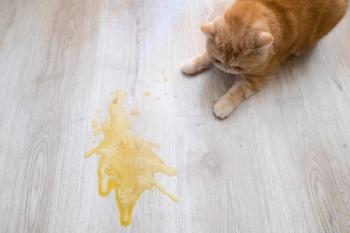
Just Ask the Expert: How do you treat cats with intestinal lymphoma?
Treatment of feline intestinal lymphoma requires instituting systemic chemotherapy, with or without surgical resection of focal intestinal lesions.
Dr. Fan welcomes oncology questions from veterinarians and veterinary technicians.
Please outline the recommended current chemotherapy protocol for feline intestinal lymphoma and expected survival times.
Fred Metzger, DVM, DABVP
Metzger Animal Hospital
State College, Pa.
About 40% of cats with lymphoma will have primary disease within their intestinal tract. Generally, intestinal lymphoma is B cell in origin and arises in geriatric cats that have negative test results for feline leukemia virus. Anatomically, most intestinal lymphomas involve the small intestine, with lesser frequency of stomach, large intestine, and colon involvement. Intestinal lymphoma can manifest as diffuse infiltrative disease or solitary focal lesions, often with accompanying mesenteric lymph node involvement.
Timothy M. Fan, DVM, PhD, DACVIM
Treatment of feline intestinal lymphoma requires instituting systemic chemotherapy, with or without surgical resection of focal intestinal lesions. The choice of systemic chemotherapy protocols is dictated by the histologic grade (low, intermediate, or high).
Low-grade intestinal lymphoma can be managed with long-term oral therapies composed of chlorambucil (4 mg/m2 orally every other day) and prednisone or prednisolone (1 mg/kg orally daily). The prognosis for cats with low-grade intestinal lymphoma can be relatively good; many cats live for years after diagnosis.
Unlike cats with low-grade variants that are easier to manage, most cats have intermediate- or high-grade lymphomas; these lymphomas are more difficult to manage for sustained durations. In general, conventional cytotoxic agents such as l-asparaginase, vincristine, cyclophosphamide, and doxorubicin are effective in reducing tumor burden in cats with intestinal lymphoma. Cats with intermediate- or high-grade lymphoma treated with a multiagent chemotherapy protocol, such as CHOP (cyclophosphamide, hydroxydaunorubicin [doxorubicin], Oncovin [vincristine], and prednisolone), may achieve response rates of 50% to 70%, and survival times range from seven to 10 months.
Timothy M. Fan, DVM, PhD, DACVIM (small animal internal medicine, oncology)
Department of Veterinary Clinical Medicine
College of Veterinary Medicine
University of Illinois
Urbana, IL 61802
SUGGESTED READING
1. Richter KP. Feline gastrointestinal lymphoma. Vet Clin North Am Small Anim Pract 2003;33(5):1083-1098.
2. Wilson HM. Feline alimentary lymphoma: demystifying the enigma. Top Companion Anim Med 2008;23(4):177-184.
Newsletter
From exam room tips to practice management insights, get trusted veterinary news delivered straight to your inbox—subscribe to dvm360.





